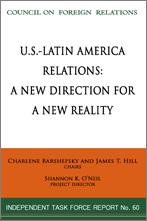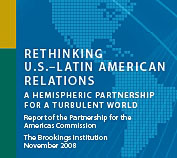Over the past year, Latin Americanists, think tanks and non-governmental organizations have released targeted reports providing prescriptions for how a new U.S. administration should approach the countries of Latin America and the Caribbean. The Council on Foreign Relations put forth U.S.-Latin American Relations: A New Direction for a New Reality in May of 2008. Michael Shifter of the Inter-American Dialogue titled his own instructions “U.S.-Latin American Relations: Recommendations for the New Administration.” Last November (2008), the Brookings Institution published Rethinking U.S.-Latin American Relations: A Hemispheric Partnership for a Turbulent World. And in the first days of April, the Brookings Institution will publish a co-edited volume entitled The Obama Administration and the Americas: Agenda for Change. Examples of other such policy memoranda abound.
 One can only hope that the new Administration is listening. Each of these reports calls for a more productive approach to Hemispheric policy than the predominant model, which still tends to espouse narrow views of U.S. security, economics and politics as the main reasons to engage the countries of Latin America and the Caribbean. Such motivations are increasingly outdated. The new approach suggested by these experts is to seek enhanced cooperation on issues of mutual interest, including: cultivation of sources of sustainable energy; reversal of climate change; management of migration; greater dissemination of the benefits of trade; and protection of the populations of the Western Hemisphere from the effects of drug trafficking, money laundering and organized crime. Developing and implementing successful policies on these issues will require sustained coordination of efforts among the countries of the Western Hemisphere.
One can only hope that the new Administration is listening. Each of these reports calls for a more productive approach to Hemispheric policy than the predominant model, which still tends to espouse narrow views of U.S. security, economics and politics as the main reasons to engage the countries of Latin America and the Caribbean. Such motivations are increasingly outdated. The new approach suggested by these experts is to seek enhanced cooperation on issues of mutual interest, including: cultivation of sources of sustainable energy; reversal of climate change; management of migration; greater dissemination of the benefits of trade; and protection of the populations of the Western Hemisphere from the effects of drug trafficking, money laundering and organized crime. Developing and implementing successful policies on these issues will require sustained coordination of efforts among the countries of the Western Hemisphere.
Cuba is treated as a unique case in each report, and is given specific focus where many countries are not: the CFR report, for example, gives four countries special note (Venezuela, Mexico, Brazil and Cuba) and the Brookings report looks individually only at Cuba. Such disaggregation is necessary in a discussion of U.S.-Latin American relations, as Cuba remains the only state in the Americas without diplomatic relations with the United States. Yet the argument for engaging Cuba falls in line with the general Latin America framework. The United States, the reports say, ultimately has an interest in cooperating with Cuba on issues like migration, human trafficking, public health, environmentally stable resource management, and the future of the Guantanamo Bay facilities.
 The opportunity to address this final issue is at hand. Guantanamo Bay’s detention facilities, long a stain not only on U.S. international reputation and credibility but also on the country’s collective conscience, will officially close within a year. In fulfillment of one of his best-known campaign promises, President Obama signed an executive order on his second day in office to start the important process of reviewing detainee files and relocating the 245 remaining prisoners currently held at the facilities in Cuba.
The opportunity to address this final issue is at hand. Guantanamo Bay’s detention facilities, long a stain not only on U.S. international reputation and credibility but also on the country’s collective conscience, will officially close within a year. In fulfillment of one of his best-known campaign promises, President Obama signed an executive order on his second day in office to start the important process of reviewing detainee files and relocating the 245 remaining prisoners currently held at the facilities in Cuba.
Ugly events in the prison have provided cheap fuel for Cuba’s international PR campaign, run since the 1960s, which depicts an imperialist and oppressive United States against which the island nation struggles to survive. (Havana had ammo enough in the trade embargo and, in previous years, the Bay of Pigs invasion and countless failed assassination attempts against Fidel Castro by the CIA). To this end, Cuba has invited international inspection of its prison facilities in order to (1) contrast them with the U.S. facilities on the same island, (2) reject the claims of human rights violations that Washington has long given as justification for the embargo, and (3) retort with similar accusations against the United States itself.
Ultimately, however, the closing of Guantanamo would not only help clean up U.S. international reputation and make Washington less of an “easy target” for Havana, but could contribute to what all of these experts are insisting upon—a more productive, open and cooperative relationship with Cuba on issues of mutual interest. What the United States ultimately decides to do with the base will be important in that connection. Will Washington insist that it remains U.S. property, even as Cuba decries the illegal and coercive circumstances under which it was taken? Or will the new Administration continue to clean its house of its less-than-exemplary past exploits, and return the property, with an agreement for its more productive use (say, a tropical diseases medical research facility)? And, perhaps most importantly, will an Obama administration seek discussions with Cuba to determine the outcome?